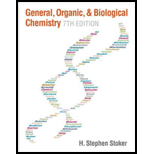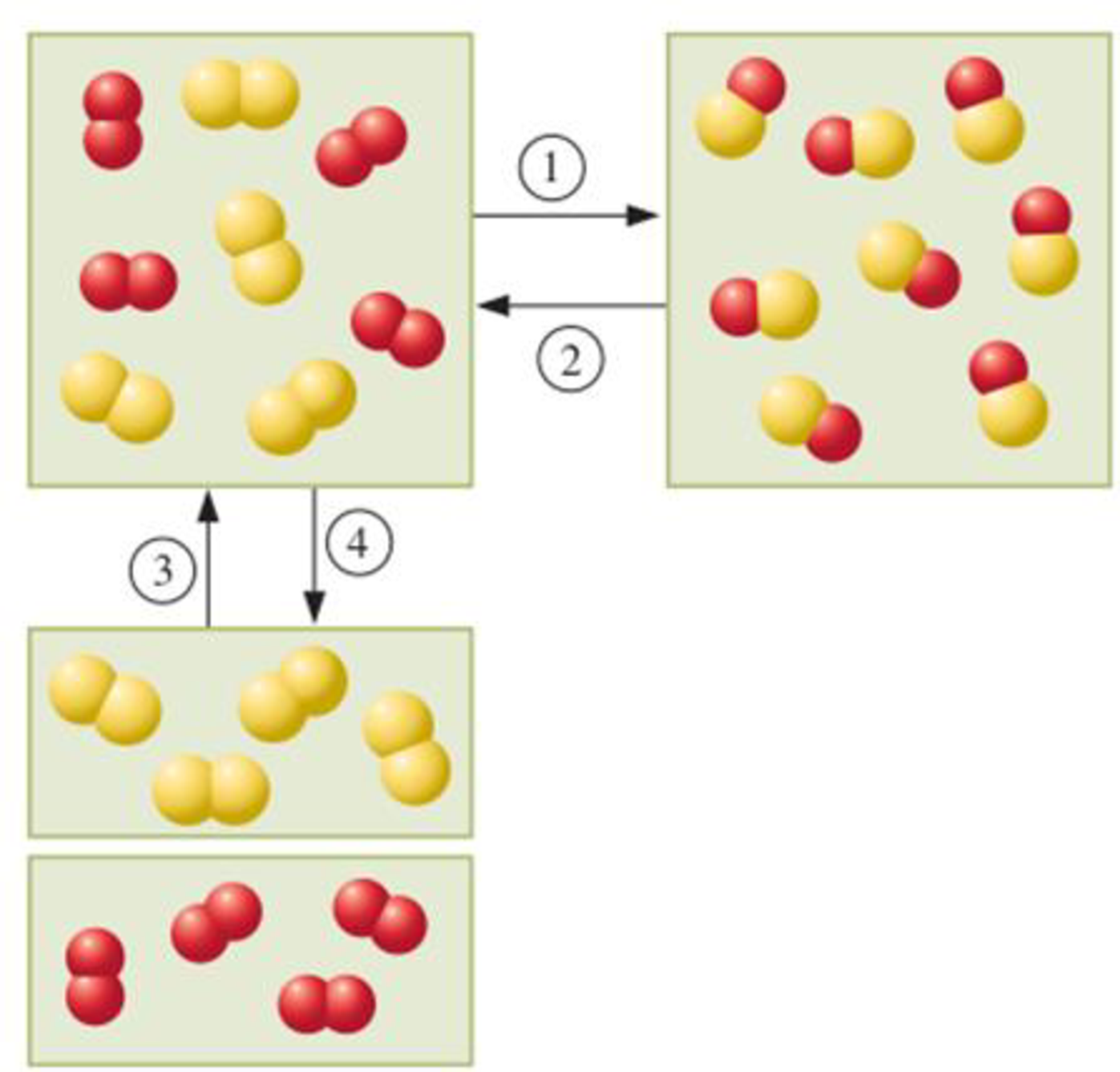
General, Organic, and Biological Chemistry
7th Edition
ISBN: 9781285853918
Author: H. Stephen Stoker
Publisher: Cengage Learning
expand_more
expand_more
format_list_bulleted
Concept explainers
Textbook Question
Chapter 1, Problem 1.71EP
In the following diagram, the different colored spheres represent atoms of different elements. Four changes, denoted by the four numbered arrows, are shown.

Select the change, by listing the arrow number, that represents each of the listed situations. (Note that there may be more than one correct answer for a given situation and that answers may be used more than once or not at all.)
- a. Which change(s) is a (are) physical change(s)?
- b. Which change(s) is a (are) change(s) in which two elements combine to form a compound?
Expert Solution & Answer
Want to see the full answer?
Check out a sample textbook solution
Students have asked these similar questions
Indicate the correct option.a) Graphite conducts electricity, being an isotropic materialb) Graphite is not a conductor of electricityc) Both are false
(f) SO:
Best Lewis Structure
3
e group geometry:_
shape/molecular geometry:,
(g) CF2CF2
Best Lewis Structure
polarity:
e group arrangement:_
shape/molecular geometry:
(h) (NH4)2SO4
Best Lewis Structure
polarity:
e group arrangement:
shape/molecular geometry:
polarity:
Sketch (with angles):
Sketch (with angles):
Sketch (with angles):
1.
Problem Set 3b
Chem 141
For each of the following compounds draw the BEST Lewis Structure then sketch the molecule (showing
bond angles). Identify (i) electron group geometry (ii) shape around EACH central atom (iii) whether the
molecule is polar or non-polar (iv)
(a) SeF4
Best Lewis Structure
e group arrangement:_
shape/molecular geometry:
polarity:
(b) AsOBr3
Best Lewis Structure
e group arrangement:_
shape/molecular geometry:
polarity:
Sketch (with angles):
Sketch (with angles):
Chapter 1 Solutions
General, Organic, and Biological Chemistry
Ch. 1.1 - Prob. 1QQCh. 1.1 - Which of the following is classified as matter? a....Ch. 1.1 - Prob. 3QQCh. 1.2 - Prob. 1QQCh. 1.2 - Prob. 2QQCh. 1.2 - Prob. 3QQCh. 1.3 - Prob. 1QQCh. 1.3 - Prob. 2QQCh. 1.3 - In which of the following pairs of properties are...Ch. 1.4 - Prob. 1QQ
Ch. 1.4 - Prob. 2QQCh. 1.4 - Prob. 3QQCh. 1.5 - Prob. 1QQCh. 1.5 - Prob. 2QQCh. 1.5 - Prob. 3QQCh. 1.5 - Prob. 4QQCh. 1.6 - Prob. 1QQCh. 1.6 - A compound can be separated into its constituent...Ch. 1.6 - Prob. 3QQCh. 1.6 - Prob. 4QQCh. 1.7 - Which of the following statements concerning the...Ch. 1.7 - Prob. 2QQCh. 1.7 - Prob. 3QQCh. 1.7 - Prob. 4QQCh. 1.8 - The correct chemical symbol for the element...Ch. 1.8 - Prob. 2QQCh. 1.8 - Prob. 3QQCh. 1.8 - Prob. 4QQCh. 1.9 - Prob. 1QQCh. 1.9 - Prob. 2QQCh. 1.9 - The molecules present in a compound must be a....Ch. 1.9 - Prob. 4QQCh. 1.10 - Prob. 1QQCh. 1.10 - Which of the following chemical formulas fits the...Ch. 1.10 - Which of the following pairings of chemical...Ch. 1.10 - Prob. 4QQCh. 1.10 - Prob. 5QQCh. 1.10 - Prob. 6QQCh. 1 - What are the two general characteristics that all...Ch. 1 - What are the three aspects of matter that are of...Ch. 1 - Classify each of the following as matter or energy...Ch. 1 - Classify each of the following as matter or energy...Ch. 1 - Prob. 1.5EPCh. 1 - Prob. 1.6EPCh. 1 - Indicate whether each of the following substances...Ch. 1 - Indicate whether each of the following substances...Ch. 1 - Classify each of the following properties of the...Ch. 1 - Classify each of the following properties of the...Ch. 1 - Indicate whether each of the following statements...Ch. 1 - Indicate whether each of the following statements...Ch. 1 - Prob. 1.13EPCh. 1 - Classify each of the following observations about...Ch. 1 - Classify each of the following changes as physical...Ch. 1 - Classify each of the following changes as physical...Ch. 1 - Prob. 1.17EPCh. 1 - Classify each of the following changes as physical...Ch. 1 - Correctly complete each of the following sentences...Ch. 1 - Correctly complete each of the following sentences...Ch. 1 - Classify each of the following as (1) a physical...Ch. 1 - Classify each of the following as (1) a physical...Ch. 1 - Classify each of the following statements as true...Ch. 1 - Classify each of the following statements as true...Ch. 1 - Prob. 1.25EPCh. 1 - Assign each of the following descriptions of...Ch. 1 - Classify each of the following as a heterogeneous...Ch. 1 - Classify each of the following as a heterogeneous...Ch. 1 - From the information given, classify each of the...Ch. 1 - From the information given, classify each of the...Ch. 1 - Prob. 1.31EPCh. 1 - From the information given in the following...Ch. 1 - Indicate whether each of the following statements...Ch. 1 - Indicate whether each of the following statements...Ch. 1 - Consider two boxes with the following contents:...Ch. 1 - Consider two boxes with the following contents:...Ch. 1 - Assign each of the following descriptions of...Ch. 1 - Assign each of the following descriptions of...Ch. 1 - Indicate whether each of the following samples of...Ch. 1 - Indicate whether each of the following samples of...Ch. 1 - Indicate whether each of the following...Ch. 1 - Indicate whether each of the following...Ch. 1 - Indicate whether each of the following statements...Ch. 1 - Indicate whether each of the following statements...Ch. 1 - Prob. 1.45EPCh. 1 - Indicate whether each of the following statements...Ch. 1 - Prob. 1.47EPCh. 1 - Prob. 1.48EPCh. 1 - Give the name of the element denoted by each of...Ch. 1 - Prob. 1.50EPCh. 1 - Prob. 1.51EPCh. 1 - Prob. 1.52EPCh. 1 - Write the chemical symbol for each member of the...Ch. 1 - Write the chemical symbol for each member of the...Ch. 1 - In which of the following sequences of elements do...Ch. 1 - In which of the following sequences of elements do...Ch. 1 - Classify the substances represented by the...Ch. 1 - Classify the substances represented by the...Ch. 1 - Classify the substances represented by the models...Ch. 1 - Classify the substances represented by the models...Ch. 1 - Classify the substances represented by the models...Ch. 1 - Classify the substances represented by the models...Ch. 1 - Assign each of the following molecular...Ch. 1 - Assign each of the following molecular...Ch. 1 - Indicate whether each of the following statements...Ch. 1 - Indicate whether each of the following statements...Ch. 1 - In the following diagrams, the different colored...Ch. 1 - In the following diagrams, different colored...Ch. 1 - Assign each of the following descriptions of...Ch. 1 - Assign each of the following descriptions of...Ch. 1 - In the following diagram, the different colored...Ch. 1 - Using the diagrams given in problem 1-71, select...Ch. 1 - Write chemical formulas for the substances...Ch. 1 - Write chemical formulas for the substances...Ch. 1 - Prob. 1.75EPCh. 1 - Prob. 1.76EPCh. 1 - Prob. 1.77EPCh. 1 - Prob. 1.78EPCh. 1 - Write all possible chemical formulas for a...Ch. 1 - Write all possible chemical formulas for a...Ch. 1 - Write a chemical formula for each of the following...Ch. 1 - Write a chemical formula for each of the following...Ch. 1 - Prob. 1.83EPCh. 1 - Prob. 1.84EPCh. 1 - On the basis of the given information, determine...Ch. 1 - On the basis of the information given, determine...Ch. 1 - Prob. 1.87EPCh. 1 - A mixture contains the following five pure...
Knowledge Booster
Learn more about
Need a deep-dive on the concept behind this application? Look no further. Learn more about this topic, chemistry and related others by exploring similar questions and additional content below.Similar questions
- (c) SOCI Best Lewis Structure 2 e group arrangement: shape/molecular geometry:_ (d) PCls Best Lewis Structure polarity: e group geometry:_ shape/molecular geometry:_ (e) Ba(BrO2): Best Lewis Structure polarity: e group arrangement: shape/molecular geometry: polarity: Sketch (with angles): Sketch (with angles): Sketch (with angles):arrow_forwardDon't used Ai solutionarrow_forwardDon't used Ai solutionarrow_forward
- reaction scheme for C39H4202 Hydrogenation of Alkyne (Alkyne to Alkene) show reaction (drawing) pleasearrow_forwardGive detailed mechanism Solution with explanation needed. Don't give Ai generated solutionarrow_forwardShow work with explanation needed....don't give Ai generated solutionarrow_forward
arrow_back_ios
SEE MORE QUESTIONS
arrow_forward_ios
Recommended textbooks for you
 General Chemistry - Standalone book (MindTap Cour...ChemistryISBN:9781305580343Author:Steven D. Gammon, Ebbing, Darrell Ebbing, Steven D., Darrell; Gammon, Darrell Ebbing; Steven D. Gammon, Darrell D.; Gammon, Ebbing; Steven D. Gammon; DarrellPublisher:Cengage Learning
General Chemistry - Standalone book (MindTap Cour...ChemistryISBN:9781305580343Author:Steven D. Gammon, Ebbing, Darrell Ebbing, Steven D., Darrell; Gammon, Darrell Ebbing; Steven D. Gammon, Darrell D.; Gammon, Ebbing; Steven D. Gammon; DarrellPublisher:Cengage Learning World of Chemistry, 3rd editionChemistryISBN:9781133109655Author:Steven S. Zumdahl, Susan L. Zumdahl, Donald J. DeCostePublisher:Brooks / Cole / Cengage Learning
World of Chemistry, 3rd editionChemistryISBN:9781133109655Author:Steven S. Zumdahl, Susan L. Zumdahl, Donald J. DeCostePublisher:Brooks / Cole / Cengage Learning Chemistry for Today: General, Organic, and Bioche...ChemistryISBN:9781305960060Author:Spencer L. Seager, Michael R. Slabaugh, Maren S. HansenPublisher:Cengage Learning
Chemistry for Today: General, Organic, and Bioche...ChemistryISBN:9781305960060Author:Spencer L. Seager, Michael R. Slabaugh, Maren S. HansenPublisher:Cengage Learning Chemistry & Chemical ReactivityChemistryISBN:9781337399074Author:John C. Kotz, Paul M. Treichel, John Townsend, David TreichelPublisher:Cengage Learning
Chemistry & Chemical ReactivityChemistryISBN:9781337399074Author:John C. Kotz, Paul M. Treichel, John Townsend, David TreichelPublisher:Cengage Learning Chemistry & Chemical ReactivityChemistryISBN:9781133949640Author:John C. Kotz, Paul M. Treichel, John Townsend, David TreichelPublisher:Cengage Learning
Chemistry & Chemical ReactivityChemistryISBN:9781133949640Author:John C. Kotz, Paul M. Treichel, John Townsend, David TreichelPublisher:Cengage Learning

General Chemistry - Standalone book (MindTap Cour...
Chemistry
ISBN:9781305580343
Author:Steven D. Gammon, Ebbing, Darrell Ebbing, Steven D., Darrell; Gammon, Darrell Ebbing; Steven D. Gammon, Darrell D.; Gammon, Ebbing; Steven D. Gammon; Darrell
Publisher:Cengage Learning

World of Chemistry, 3rd edition
Chemistry
ISBN:9781133109655
Author:Steven S. Zumdahl, Susan L. Zumdahl, Donald J. DeCoste
Publisher:Brooks / Cole / Cengage Learning


Chemistry for Today: General, Organic, and Bioche...
Chemistry
ISBN:9781305960060
Author:Spencer L. Seager, Michael R. Slabaugh, Maren S. Hansen
Publisher:Cengage Learning

Chemistry & Chemical Reactivity
Chemistry
ISBN:9781337399074
Author:John C. Kotz, Paul M. Treichel, John Townsend, David Treichel
Publisher:Cengage Learning

Chemistry & Chemical Reactivity
Chemistry
ISBN:9781133949640
Author:John C. Kotz, Paul M. Treichel, John Townsend, David Treichel
Publisher:Cengage Learning
Types of Matter: Elements, Compounds and Mixtures; Author: Professor Dave Explains;https://www.youtube.com/watch?v=dggHWvFJ8Xs;License: Standard YouTube License, CC-BY